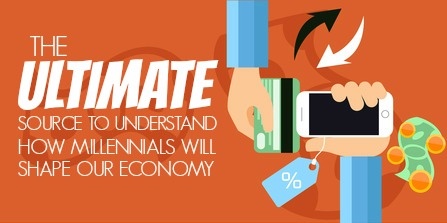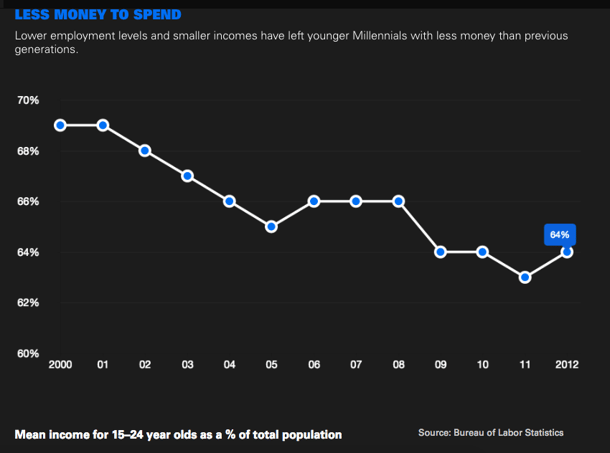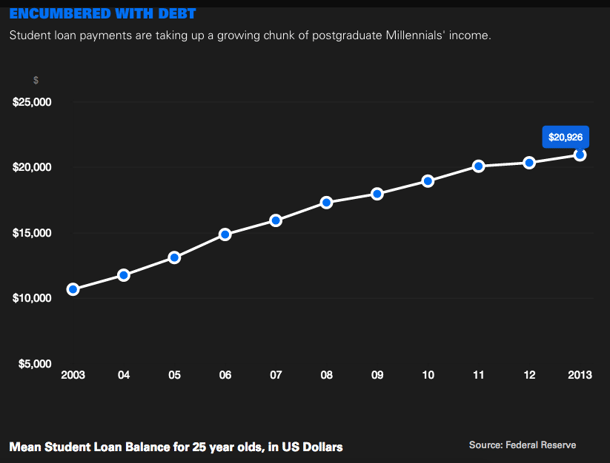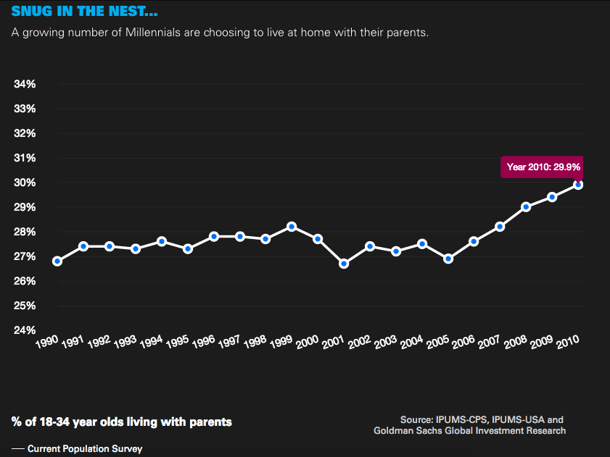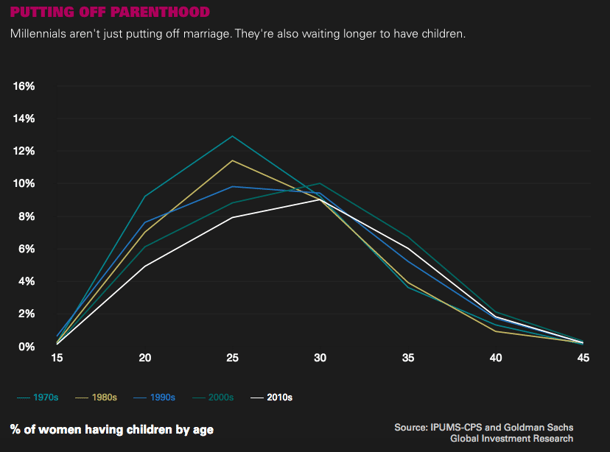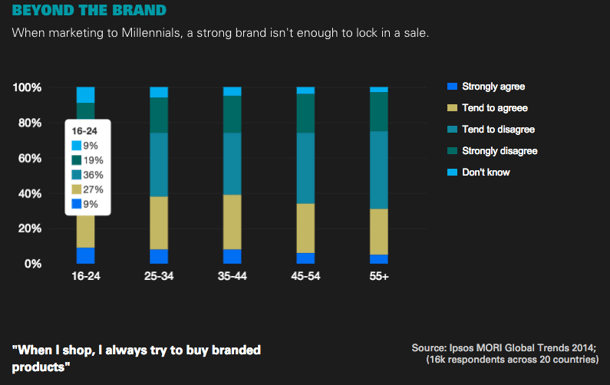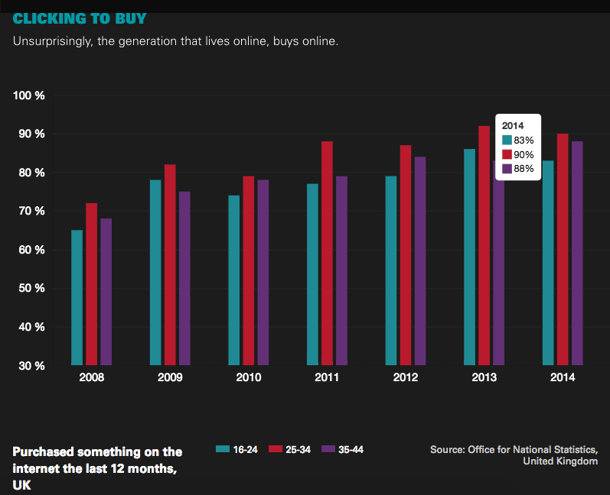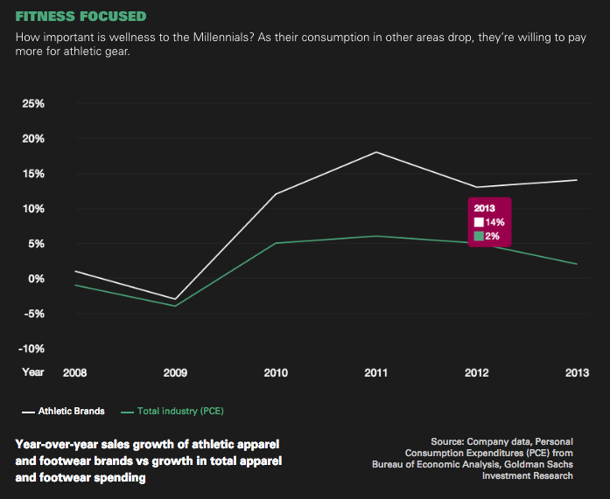The economy is poised for a transformation as the largest generation on the planet, the Millennials, enter their prime working and spending years. Technology and the Internet have created new behaviors and instilled new values into an entire generation which is now forcing organizations to reexamine how they will thrive in tomorrow’s marketplace.
Recently Goldman Sachs released an animated infographic dedicated to the attitudes and interests of Millennials. It provides comprehensive insights into what we can expect from Millennials when it comes to housing, marriage, ownership, retail, and wellness. Below are the fascinating insights according to Goldman Sachs.
A Millennial Overview
- Technology, a turbulent economic climate, and globalization have given the Millennial generation a new set of perspectives, experiences, and behaviors.
- Millennials are waiting to get married, move out on their own, and they have a new approach to ownership which has birthed the “sharing economy.”
- Being raised in a digital age, Millennials’ affinity for technology has influenced how they shop. They value instant access to product information, peer reviews, and price comparisons.
- Millennials are dedicated to wellness. They see extreme value in exercising and eating right. They will continue to support their active lifestyles with their wallets and time.
Who Are They
A different world, a different worldview. Millennials have grown up in a time of rapid change, giving them a set of priorities and expectations sharply different from previous generations.
- Millennials (ages 15-35) = 92 million
- Generation X (ages 36-50) = 61 million
- Baby Boomers (ages 51-70) = 71 million
Source: US Census Bureau
Which online activities do Millennials regularly do for fun and entertainment?
- 50% play video games. (Compared to 27% of Generation X and 16% of Baby Boomers)
- 45% IM/Chat. (Compared to 31% of Generation X and 10% of Baby Boomers)
- 44% download music/video. (Compared to 33% of Generation X and 17% of Baby Boomers)
- 37% use social media. (Compared to 35% of Generation X and 23% of Baby Boomers)
- 38% watch TV online. (Compared to 26% of Generation X and 18% of Baby Boomers)
Source: Prosper Insights & Analytics for the Media Behavior and Influence Study
After searching online, how do Millennials communicate with others about a service, product, or a brand?
- 44% text messaging.
- 38% social media.
- 38% instant messaging.
- 16% blogging.
Source: Prosper Insights & Analytics for the Media Behavior and Influence Study
Housing
As Millennials enter their peak home-buying years (25-45 years-old according to Goldman Sachs Global Investment Research), their reluctance to enter the housing market could change. The cohort’s sheer size, plus its desire to settle down in the future, could lead to a surge in home sales. An overwhelming percentage of Millennials say they want to own a home sometime in the future. 93% of renters (ages 18-34) plan to buy a home some day. (Trulia)
Love and Marriage
According to Goldman Sachs Global Investment Research, the median marriage age in 1970 was 23 and in 2010 it was 30. Millennials have been putting off significant milestones like marriage, home ownership, and children. In fact, 23% of 18-31 year olds were married and living in their own household in 2012. Compared to 56% in 1968. (Pew Research Center, Current Population Survey)
Millennials may be putting marriage off, but polls have shown they do want to have their own families some day.
- 70% of Millennials do want to get married.
- 74% of Millennials do want to have children.
Source: Pew Research Center
Access, Not Ownership
The must-haves for previous generations aren’t as important for Millennials. They’re putting off major purchases—or avoiding them entirely. Millennials have been reluctant to buy such things as homes, cars, music, and luxury goods. Instead, they’re turning to a new set of services that provide access to products without the burdens of ownership, giving rise to what’s being called a “sharing economy."
- House: 40% of Millennials said it was "extremely important” to own; another 30% stating “important, but not a big priority.”
- Car: 30% of Millennials said “I do not intend to buy one in the near future;” another 25% stating “I might purchase one if I really need it, but indifferent otherwise."
- TV: 30% of Millennials said “important, but not a big priority” to own and 20% said “I do not intend to buy one in the near future.”
- Luxury Bag: 25% of Millennials said “I do not intend to buy one in the near future;” another 25% stating “I do not feel strongly about it.”
Source: Goldman Sachs Fortnightly Thoughts intern survey, 2013
A growing percentage of older Millennials are choosing to rent, not buy.
- In 2005, 52% of the total U.S. population were renters (ages 25-34).
- In 2013, 60% of the total U.S. population were renters (ages 25-34).
Source: Organization for Economic Co-operation and Development
Brands and Retail
Millennials’ affinity for technology is reshaping the retail space. With product information, reviews, and price comparisons at their fingertips, Millennials are turning to brands that can offer maximum convenience at the lowest cost.
- 57% of Millennials compare prices in store.
- 35% of Millennials stated that price makes them loyal to a brand.
- 55% of Millennials stated that quality makes them loyal to a brand.
Source: AIMIA Inc. “Born this Way: US Millennial Loyalty Survey” 2012
If brands are shrinking in importance, social media is growing. Millennials are turning to their online networks when making purchasing decisions.
- 34% of Millennials (ages 18-35) agreed with the statement, “When a brand uses social media, I like that brand more.” Compared to 16% of individuals ages 36+.
Source: Association of National Advertisers, Barkley, SMG, BCG
Wellness
As young Millennials pursue wellness, they are turning away from unhealthy habits. They are exercising more, eating smarter, and smoking less than previous generations. They are using apps to track training data and online information to find the healthiest food. And this is one space where they are willing to spend more for compelling brands.
- 83% of 12th graders disapprove of people 18 or older smoking 1 or more packs of cigarettes a day. Compared to 69% in 1998.
- 72% of 12th graders disapprove of people 18 or older taking one or two drinks nearly every day. Compared to 69% in 1998.
Source: monitoringthefuture.org
Question: What other Millennial trends do you think will shape our economy?

